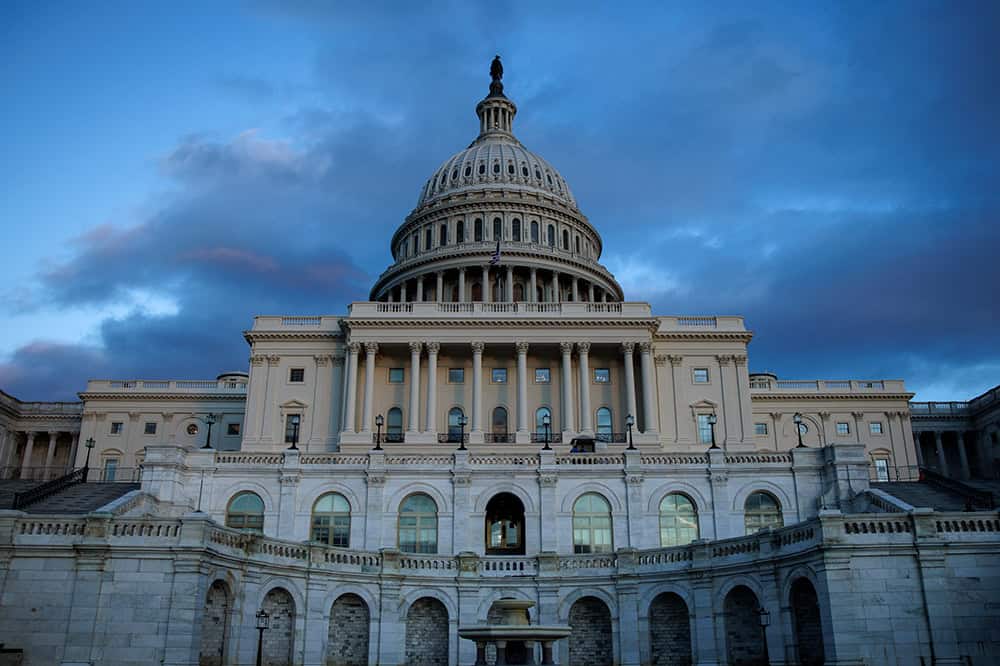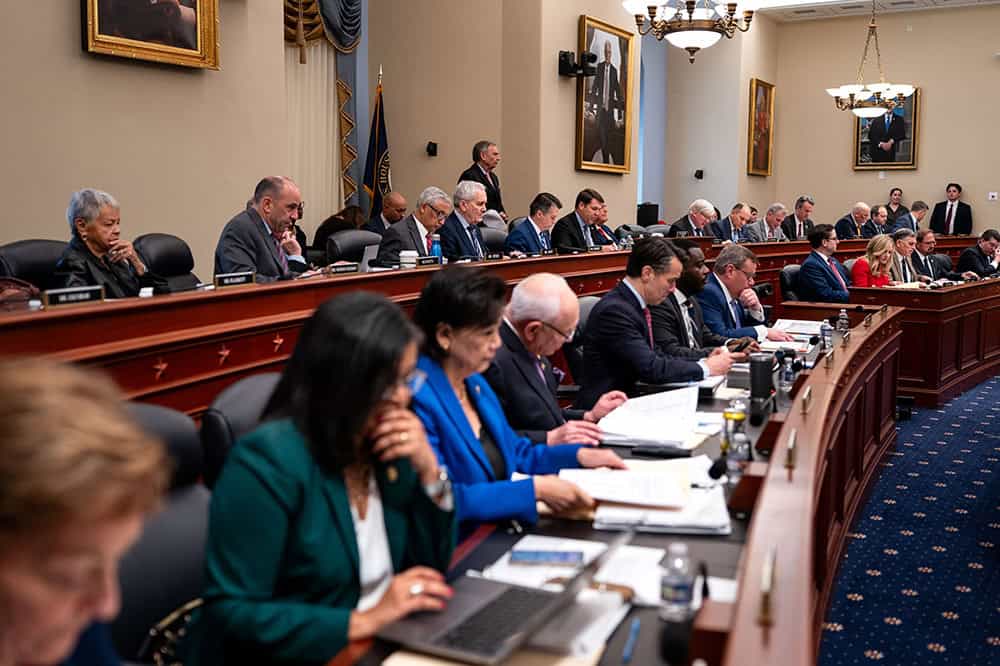President Bill Clinton and Governor Chris Christie Lead Keynote Discussion of ‘Our Economic Future’ at Peterson Foundation Fiscal Summit in Washington
America’s pre-eminent experts and leading policymakers highlight connection between nation’s long-term debt and economic growth, opportunity, mobility, and prosperity
Participants include House Democratic Leader Nancy Pelosi, Senate Budget Chair Patty Murray, Senator Rob Portman, House Republican Chief Deputy Whip Peter Roskam, Former Fed Chair Alan Greenspan and other leaders
WASHINGTON, DC — Top lawmakers and policy experts convene today in Washington for a discussion about America’s economic future at the Peter G. Peterson Foundation’s fifth annual Fiscal Summit. With keynotes from President Bill Clinton and Governor Chris Christie, the 2014 Fiscal Summit: Our Economic Future highlights the connection between a strong fiscal foundation and a growing, thriving economy.
The Fiscal Summit convenes preeminent voices from across the political spectrum — including elected officials, economic policy experts, business leaders and members of the media — to examine the interconnected relationship between addressing our nation’s long-term debt and achieving economic opportunity, mobility and growth, now and in the future. Conversations will focus on how the fiscal policy choices that are made today will impact our nation’s ability to compete, innovate, and lead tomorrow.
“Our nation’s economic health depends on its fiscal health,” said Foundation Chairman Peter G. Peterson. “Our growing long-term debt threatens to constrain our options and crowd out our ability to make critical investments in our future, in areas like infrastructure, research and development, and education. Getting our fiscal house in order means we’ll be able to ensure a strong economic future, with vibrant economic growth and shared prosperity.”
“Fiscal reform is not an end in itself — it is a means to improving people’s lives through a growing, thriving economy,” said Foundation President and COO Michael A. Peterson. “A strong fiscal foundation will drive economic growth by increasing access to capital and enhancing confidence, and will give America a greater ability to innovate and compete in the future. Americans understand the fiscal-economic connection, and overwhelming majorities agree that they will have more mobility and opportunity if our nation gets its fiscal house in order.”
2014 Summit participants include:
- President Bill Clinton
- Governor Chris Christie, State of New Jersey
- House Democratic Leader Nancy Pelosi (D-CA)
- Senator Patty Murray (D-WA), Chairman of the Senate Budget Committee
- Senator Rob Portman (R-OH), Member of the Senate Budget and Finance Committees
- House Republican Chief Deputy Whip Peter Roskam (R-IL)
- Alan Greenspan, President of Greenspan Associates; Former Chairman, Federal Reserve Board
- Erskine Bowles, President Emeritus of the University of North Carolina; Co-Chair of the National Commission on Fiscal Responsibility and Reform
- Glenn Hubbard, Dean and Professor of Finance and Economics at Columbia Business School
- Alan Krueger, Professor of Economics and Public Affairs at Princeton University
- John Engler, President of Business Roundtable
- Sheila Bair, Former Chairman, Federal Deposit Insurance Corporation; Senior Advisor, The Pew Charitable Trusts
- Peter G. Peterson, Chairman of the Peter G. Peterson Foundation
- Michael A. Peterson, President and COO of the Peter G. Peterson Foundation
The Summit will also feature a series of videos spotlighting perspectives from a range of leaders in business, technology, academia, and social advocacy, including:
- Jeff Immelt, Chairman and CEO of General Electric
- Mayor Michael Bloomberg, Chairman of Bloomberg Philanthropies
- Sheryl Sandberg, COO of Facebook
- Darren Walker, President of the Ford Foundation
- Richard Florida, Founder of the Creative Class Group and Director of the Martin Prosperity Institute
Interviewers and Moderators include:
- Bob Schieffer, Chief Washington Correspondent and Anchor of “Face the Nation,” CBS
- Gwen Ifill, Moderator and Managing Editor of “Washington Week” and Co-Anchor and Managing Editor of the “PBS NewsHour,” PBS
- Peter Cook, Chief Washington Correspondent, Bloomberg Television
- Lori Montgomery, Fiscal Policy Reporter, The Washington Post
- Nancy Cordes, Congressional Correspondent, CBS News
- Ben White, Chief Economic Correspondent, POLITICO
More information about the Summit is available at: www.fiscalsummit.org.
Earlier this week, the Peterson Foundation published polling results measuring public sentiment on the national debt and its impact on economic growth. Key findings of the survey include:
- Voters overwhelmingly agree (91%) that a stable fiscal foundation will help the economy grow; 63 percent agree strongly.
- 85 percent agree that debt reduction will benefit the national economy, including broad majorities of Democrats (75%), Independents (90%), and Republicans (90%).
- Nearly nine in ten (87%) voters believe that the national debt, at its current level, is stifling the economy.
- Fully eight in ten voters (80%) say economic mobility and opportunity are likely to be more attainable for everyday Americans if the United States reduces the debt, including 44% who say it is very likely.
- 83 percent agree that there will be more opportunities for everyday Americans to be successful in an economy less burdened by the national debt. Americans are united in their beliefs across socioeconomic lines, as the working/lower middle class (82%), the middle class (86%), and the upper middle class/affluent (76%) all overwhelmingly agree.
- Voters widely agree that younger Americans (82%), the middle class (82%), lower-income Americans (70%), and the unemployed (73%) will benefit from addressing our long-term fiscal challenges.
- 70 percent of voters believe reducing the debt would increase companies’ confidence in the economy, leading to more investment and hiring of new workers.
- Americans identify consumer confidence as a key connection between debt reduction and a healthier economy, with 88 percent saying consumers will likely have more confidence in the economy if the United States reduces its national debt.
- 84 percent believe that the United States is likely to be more competitive in a global economy if it reduces the national debt.
- Three-quarters of Americans (75%) believe that the nation will have less money to spend on education, research and infrastructure as a result of its debt burden.
- 83 percent of voters believe that the current level of national debt makes our economy less stable.
- 86 percent of Americans believe the United States is likely to be better prepared for the next economic or financial crisis if the debt is reduced.
- 86 percent of voters expect that the stability brought on by sound fiscal policy will be felt directly by American families, with broad majorities believing that a more stable fiscal foundation will lead to a more stable and secure middle class.
For more poll results, please click here.
About the Peter G. Peterson Foundation
The Peter G. Peterson Foundation is a nonprofit, nonpartisan organization that is dedicated to increasing public awareness of the nature and urgency of key long-term fiscal challenges threatening America’s future, and to accelerating action on them. To address these challenges successfully, we work to bring Americans together to find and implement sensible, long-term solutions that transcend age, party lines and ideological divides in order to achieve real results. To learn more, please visit www.pgpf.org.
Further Reading
Long-Term Budget Outlook Leaves No Room for Costly Legislation
As lawmakers consider costly legislation to extend expiring tax provisions this year, CBO’s latest projections serve as a warning that our fiscal outlook is already dangerously unsustainable.
Republicans Considering Costly Tax Cut Proposals
Leaders in Congress and the Administration have outlined a broad package of tax cuts that could total $9.1 trillion.
Moody’s Warns Recent Policy Decisions Worsen U.S. Fiscal State, Maintains Negative Outlook Rating
Moody’s says that the United States is in fiscal deterioration, warning that government policy decisions in the near term could contribute to higher interest rates and worsening national debt.


